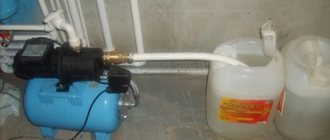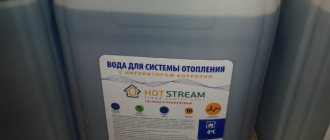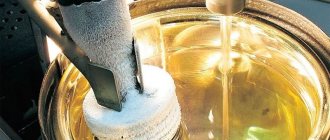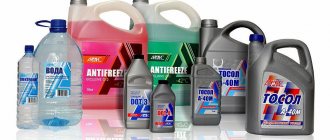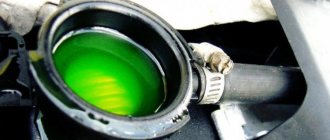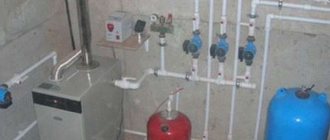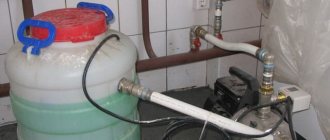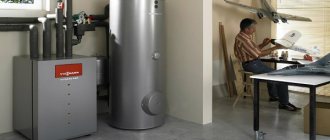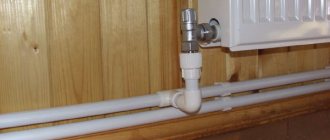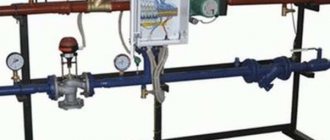The "nightmare" of any owner of an autonomous heating system (CO) at home is the boiling or freezing of the coolant. Everyone is well aware that both the first and the second can lead to depressurization of the circuits or destruction of the water jacket of the heat generator, which is fraught with huge financial costs. And if the boiling of the liquid, as a rule, is prevented by the automation, then only the constant operation of the boiler plant can save the CO from freezing, which is not always possible (power outage, failure of the boiler unit). This publication will focus on liquids with a low freezing point used as a heat carrier in autonomous heating systems.
[contents]
A little about substances that carry heat
Before we get acquainted with the types of coolants and find out their characteristics, let's figure out what good and high-quality fluids of this type should be? What is this anyway?
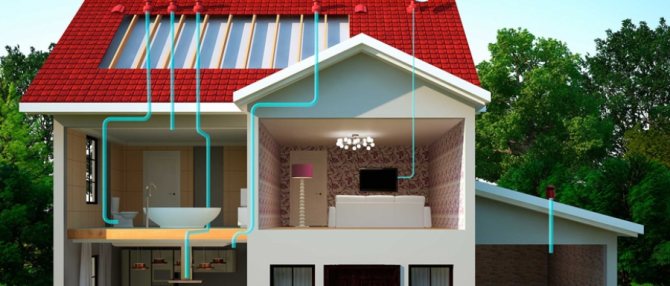
Heating media for heating systems
So, coolant is a substance that is inside the heating system and is responsible for the preservation of heat and its redistribution in the residential (or non-residential) premises from the heating boiler through pipes and radiator batteries... As a rule, either water or antifreeze is used for this. Each of these substances has positive and negative aspects of use - unfortunately, there is no ideal heat carrier. That is why the decision about what is better to pour into the heating system should be made depending on certain factors: the conditions for using the entire system, the quality of heating equipment, the rest of the equipment, and so on.
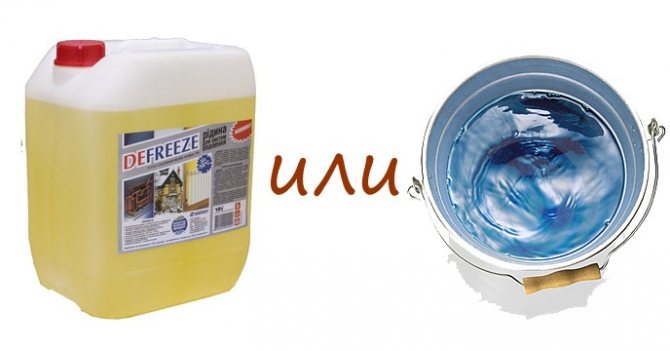
Antifreeze or water?
Attention! The operation of any coolant also strongly depends on the boundaries of a certain temperature range - in cases that are not suitable for a particular substance, the coolant will simply refuse to work correctly, and the quality characteristics will change significantly.
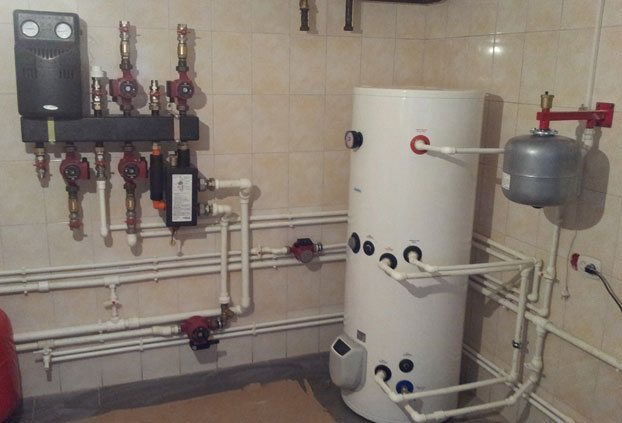

Heating system of a private house
But, despite the fact that ideal heat carriers do not exist, we will still think: what would it be like if it existed?
In general, a substance that will store and transfer heat through the heating system must have the following properties:
- high heat capacity;
- good thermal conductivity;
- low viscosity;
- the ability to transfer the maximum amount of thermal energy with minimum heat loss for a certain time;
- freezing only at very low temperatures;
- stability of properties during use;
- lack of ability to cause rust;
- low toxicity;
- high ignition temperature;
- lack of tendency to form a layer of scale;
- inertness in relation to various materials used in the heating system;
- low price;
- long service life.
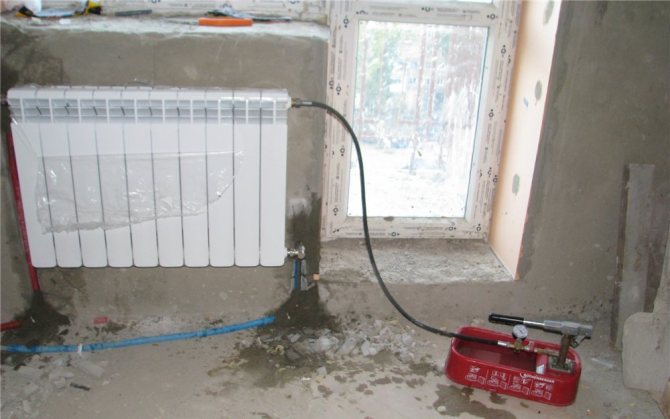

Filling the heating system with coolant
Unfortunately, the coolant has not yet been invented that would fully meet all these requirements. However, you can still make the right choice of this substance. But for this it is important to know what properties water and antifreeze have as a heat carrier.
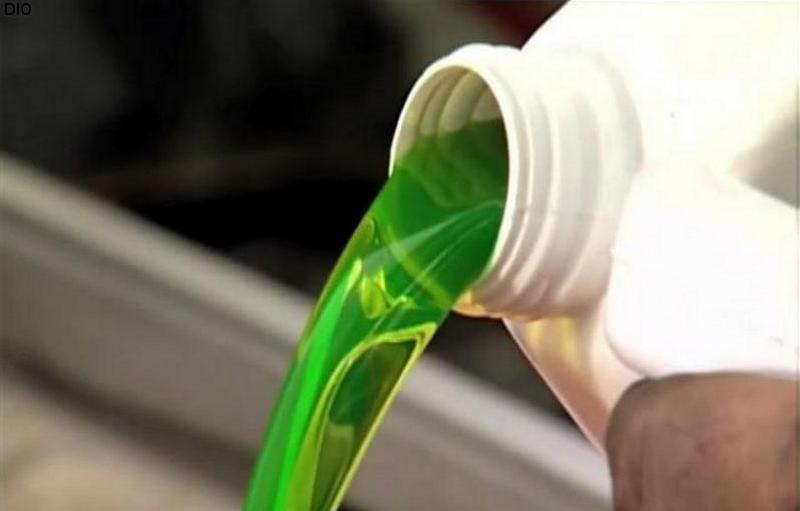

Antifreeze for heating systems
Heat carrier for heating systems - water or antifreeze, which is better?
Maps, Transport, GPS. Climate, Weather, Time Zones. Codes, Indexes, Addresses. Permanent residence, real estate. Other about cities and countries. Other social topics. Media.
What should be considered?
Food, Cooking Appetizers and Salads. First meal. Second courses. Desserts, Sweets, Pastries.Celebration, Celebration. Cooking for children. Cooking in Purchase and selection of products. Hastily. Other culinary. Photography, Videography Photo processing and printing. Video processing.
Selection, purchase of equipment. Equipment care. Technique, themes, genres of shooting. Other photo-video. Products and Services Gift Ideas. Home Appliances. Other manufactured goods. Service, maintenance and repair. Other services. Leisure, Entertainment Hobby. Concerts, Exhibitions, Performances. Hunting and fishing. Clubs, Discos.
Despite many innovations that use hot air, infrared radiation or electric heaters for heating, hot water heating is still the main method for heating rooms. Such a system is efficient and reliable, and installation and operation are less expensive than most alternatives.
Restaurants, Cafes, Bars. Tips, Ideas. Games without a computer. Other entertainment. New Year. Valentine's Day. March 8. Science, Technology, Languages Humanities. Natural Sciences. Job, Career Resume writing. Part-time job, temporary work. Recruitment agencies. Human Resources Department, HR. Professional growth. Change and search for a job. Work environment. Employment abroad. Other career matters.
Horoscopes, Magic, Divination Horoscopes. Other predictions. Legal advice Administrative law. Civil law. Constitutional law. Family law.
Water
Water is a unique and the only liquid in nature that expands both when heated and cooled. Its high density, equal to 917 kg / m3, varies greatly with temperature. This property can do a "disservice" to the owner of the house - if it expands during freezing, the liquid can easily damage the heating system.
Water has a maximum heat capacity (1 kcal / (kg * deg)). This means that when a kilogram of this liquid is heated to a temperature of +90 degrees, and then it is cooled in a heating radiator to +70, as much as 20 kcal of thermal energy will enter this very radiator.
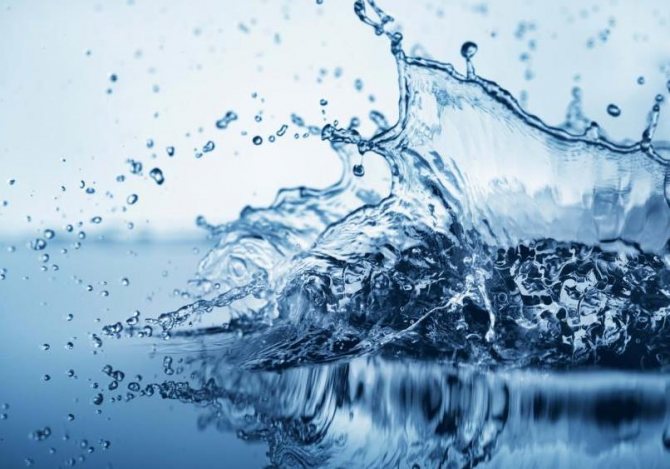

Water as a heat carrier
Water is perhaps the most accessible and cheapest type of heat carrier, besides, it is distinguished by a high level of safety and is unlikely (under any conditions) to pose a serious threat to the health of the owner of the house and his family. And in the event of a leaking working fluid from the heating system, the deficiency can be easily replenished by pouring ordinary tap water.
Interestingly, water is not just a combination of two hydrogen molecules with one oxygen molecule. In fact, it also contains other elements - these are metals, chlorine impurities and various salts. Unfortunately, because of this, water can cause various deposits to appear inside the heating system and even lead to failure over time.
On a note! It is advisable to use distilled water for the heating system, since it has a minimum of impurities. But in this case, you will have to spend a certain amount of money - it is unlikely that you will be able to collect it in the required quantities for free.
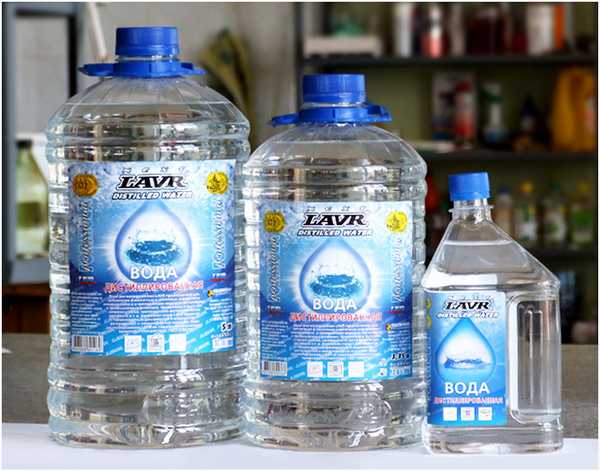

Distilled water
As a working fluid for the heating system, it is advised to use rainwater or its analogue - melt water, because even these fluids have fewer impurities and additives than water from a tap or from a well.
disadvantages
The main disadvantages of water as a heat carrier:
- high corrosive activity;
- scale formation;
- the possibility of destruction of the heating system in just a couple of days if the liquid accidentally freezes;
- fluid change should be done annually.
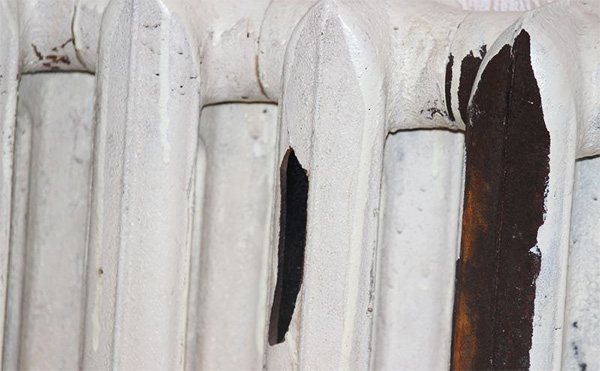

In the photo - the consequences of freezing water in the battery
The water scale can be slightly reduced. This process is called mitigation.The easiest option is to simply boil water in a metal container without closing the lid. Some connections that have no place in the heating system will settle to the bottom, carbon dioxide will be released. Unfortunately, only some substances can be removed by boiling - for example, unstable calcium or magnesium bicarbonates.
There is also a chemical method for improving the composition of water, which turns soluble salts in a liquid into insoluble. It is carried out using slaked lime, sodium orthophosphate or soda ash. All of these additives are capable of causing precipitation that can be removed by simply filtering the water.
Attention! It is necessary to work with sodium orthophosphate carefully - the dosage of this substance should be strictly observed.
Antifreeze
Antifreeze or a mixture of ordinary water, additives and a certain component (propylene glycol or ethylene glycol) can be used as a coolant in the heating system of a private house. This substance has a lower freezing threshold, due to which it perfectly tolerates severe cold winters. At the same time, antifreeze, unlike water, does not expand, harden or damage pipes even during an accidental shutdown of the system and strong cooling of the room. The liquid becomes gelatinous and is unable to spoil radiators, which have a much higher density. At the same time, when heated, the substance returns to a liquid state while maintaining its original properties.
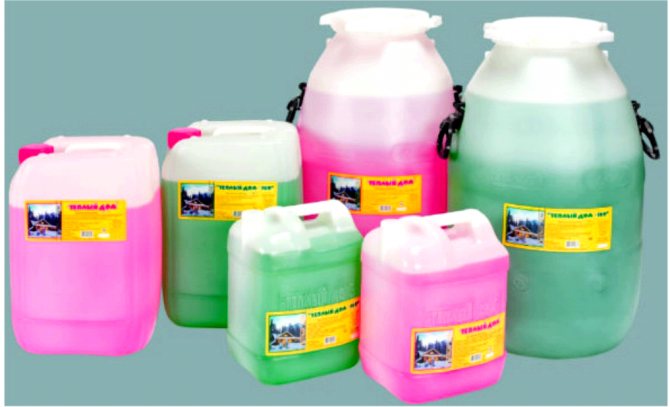

Antifreeze for the heating system
On a note! Due to a special chemical composition, antifreeze lasts for at least 5 years (water - only a year), while such a coolant does not cause scale or corrosion, since special additives are added to it. But it is worth remembering that these additives are not universal and are designed for certain types of alloys and metals. If you choose the wrong antifreeze, then it can damage some parts of the heating system.
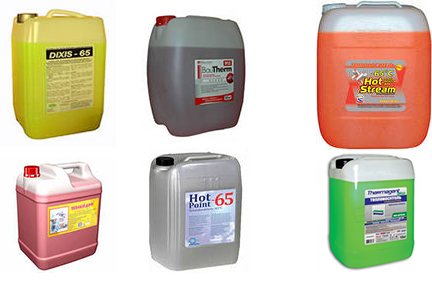

Non-freezing coolants for heating systems of various manufacturers
In the northern regions and in areas with a temperate climate, two types of antifreeze are used - with temperature thresholds of freezing of -30 and -65 degrees. At the same time, the latter type can be easily converted into the first, just by diluting it with distilled water in a 1: 2 ratio.
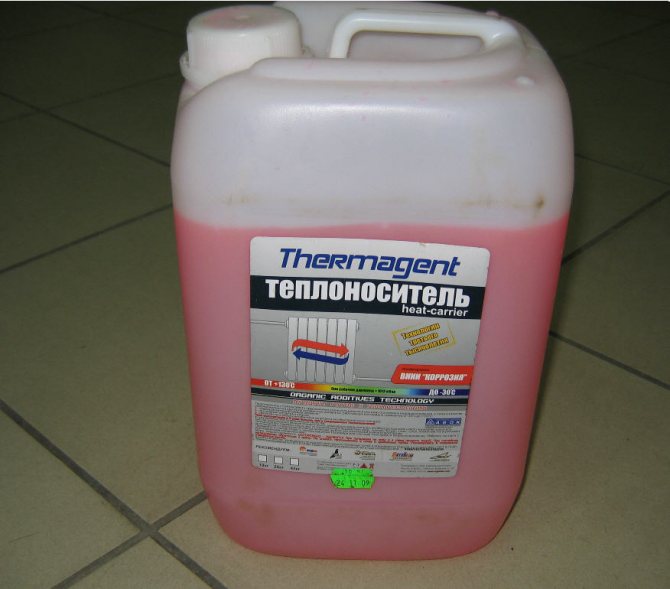

Before you buy - let's take an interest in the composition
Table. Types of antifreeze for heating systems.
| Basic substance | Antifreeze characteristic |
| Monoethylene glycol (ethylene glycol) | This is a cheaper and more common type of antifreeze. But at the same time, this liquid is quite toxic, therefore you need to work with it carefully, protecting the skin, eyes and respiratory organs. Also, ethylene glycol, when in contact with zinc, easily reacts with it, so the composition of the alloy from which the entire heating system is made plays an important role here. Ethylene glycol in just one season is capable of destroying galvanized steel, if any. |
| Propylene glycol | A more expensive and safer type of antifreeze. A relative of technical propylene glycol - food - is used in medicine, pharmaceuticals, food industry, as it is completely safe for human health and the environment. That is why propylene glycol antifreezes can be used in any, including double-circuit heating boilers - if the substance gets into the water, then the residents of the house will not receive any harm. Also, this type of antifreeze does in some way the same job as a lubricant, therefore it has a beneficial effect on possible pumping systems. At the same time, the heat transfer of this substance is much higher than that of monoethylene glycol antifreeze. |
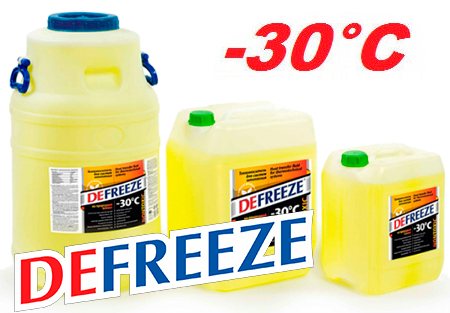

Anti-freeze liquid for heating systems DEFREEZE
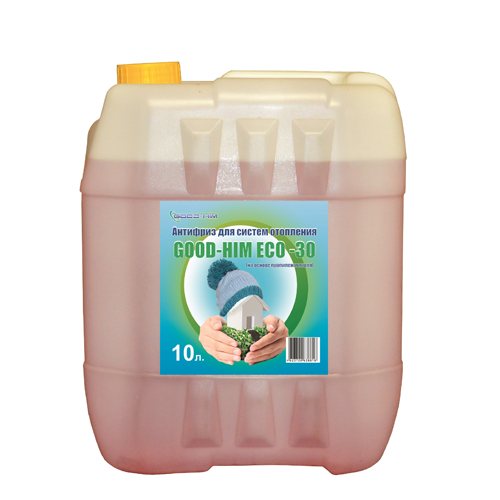

Antifreeze for heating systems GOOD-HIM ECO -30
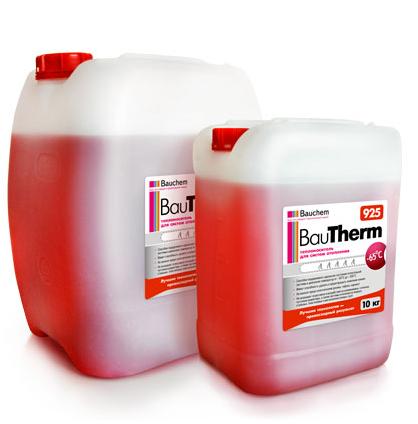

BauTherm 925 at -65
disadvantages
But antifreezes, as wonderful as they are, also have their drawbacks.The main one is high sensitivity to high temperatures and overheating. In this case, antifreeze decomposes, forming acids and precipitates. The latter are capable of forming carbon deposits on the heating elements. And this carbon deposit strongly affects the quality of heat transfer and becomes the cause of the next overheating. The acids, in turn, begin to react with the alloy elements from which the pipes of the heating system are made. The result is corrosion.
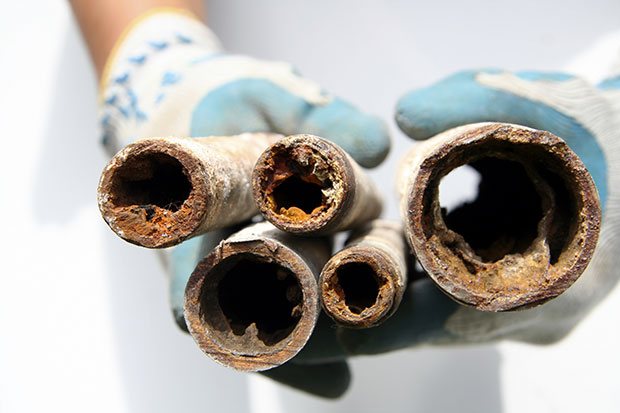

Corrosion of pipes
Other disadvantages of antifreeze:
- high fluidity, therefore, a better sealing of the heating system is needed to avoid leaks;
- heat capacity is 15% lower than that of water;
- the viscosity is twice that of water;
- certain types of antifreeze are toxic and are used only in single-circuit heating boilers;
- the need to select a specific type of antifreeze for a specific alloy;
- the ability to foam under special conditions;
- antifreeze will have to be kept at home in case of an accidental leak in order to be able to add it to the system right away.
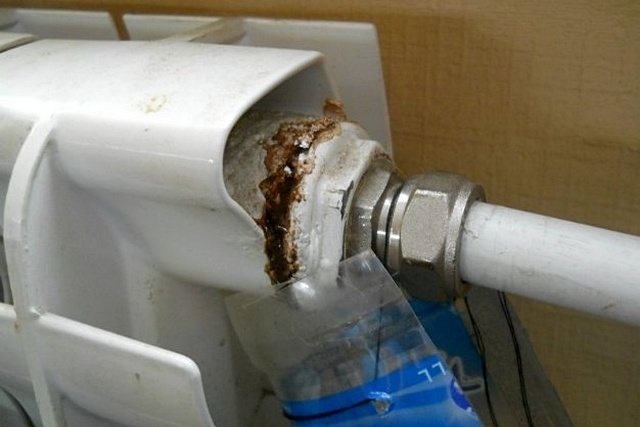

Corrosion processes in this circuit are so active that they led to the thinning of the connection and its leakage.
Antifreeze prices for the heating system
antifreeze for the heating system
Ethylene glycol: what keeps its popularity
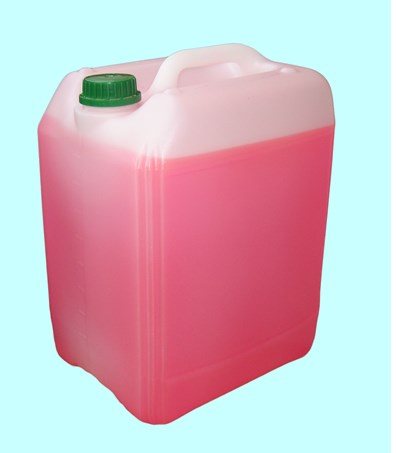

This substance is a polyhydric alcohol, tasteless, colorless and odorless. In its pure form, it loses its properties even at -13 ° C. That is why only aqueous solutions of ethylene glycol in various concentrations are used. The maximum temperature at which the composition freezes (-50) is reached when the concentration of the active substance with water is 6: 4.
Almost non-freezing coolant compositions based on ethylene glycol became popular all over the world already in the middle of the last century. The basis for the popularity of ethylene glycol-based antifreezes is its cheapness.
Ethylene glycol is toxic. According to the international classification, this substance is assigned a hazard class 3. His vapors are dangerous to humans and pets. That is why it is used only in closed CO. Ethylene glycol based antifreezes attack elements of heating systems, especially metals coated with zinc and its alloys. There is one more drawback - the decomposition of ethylene glycol in solution at a temperature of + 70 ° C. To detect leaks, the "non-freeze" data is colored red.
Important! It is forbidden to use antifreeze in double-circuit heating systems due to the risk of the active substance entering the hot water supply system.
Application rules
Also, antifreeze, unlike water, is more "scrupulous" in relation to the rules of use - the possibility of its use significantly depends on their observance.
- The pumps required to circulate the coolant must be very powerful, otherwise it will be difficult for the antifreeze to move through the pipes. In some cases, it may be necessary to install an external blower.
- Pipes with a large diameter should be used and the radiators should also be large.
- Air removal devices should not be automatic.
- The gaskets and seals used in the system can only be made of dense and resistant to chemical compounds rubber or made of teflon and paronite.
- When the boiler is turned on, the heating temperature should be increased gradually. In this case, the temperature of the coolant should not exceed +70 degrees.
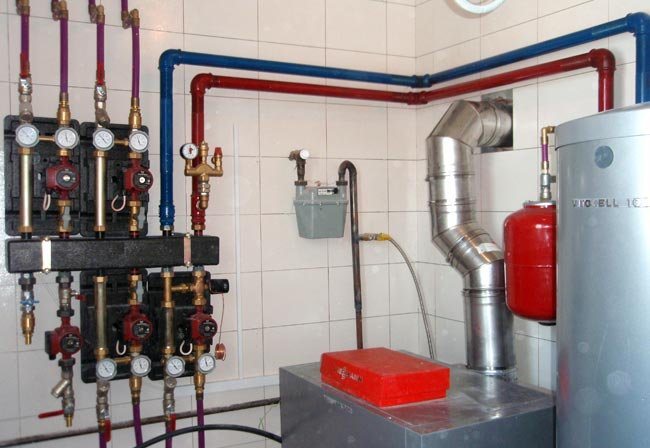

The power of the heating boiler should be increased gradually after starting.
Antifreeze should never be used in the following cases:
- if the heating system in the house is an open type system;
- if the heating system is galvanized;
- if the heating boiler is capable of heating the antifreeze by more than +70 degrees;
- if oil paint was used as a sealant for the joints in the system, linen winding;
- if ion boilers are used.
Making the right choice
How to make the right choice regarding the substance responsible for the transfer of heat and heating the house? To do this, it is worth analyzing the operating conditions of the heating system and how and from what it is made. Ordinary water can become an optimal heat carrier, for example, if the temperature in the heating circuit (even in extreme cold outside) in the house will not be lower than +5 degrees. Otherwise, it is better to consider buying antifreeze. At the same time, when choosing antifreeze, take into account its threshold temperature values, composition, period of use, environmental friendliness and safety, as well as the possibility of interaction with elements of the heating system.
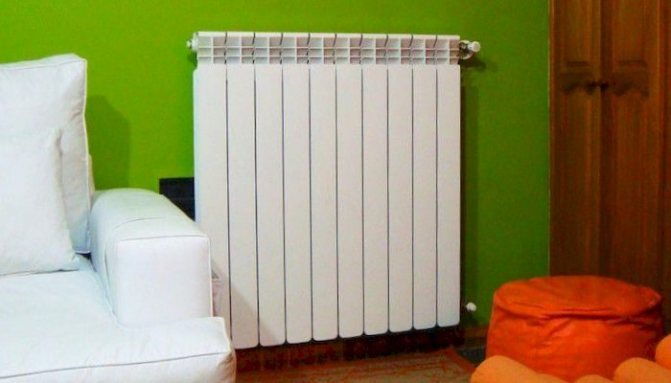

How to choose antifreeze for a heating system
On a note! It is best to choose propylene glycol antifreeze. It is not hazardous to health, and in a number of characteristics it is better than others.
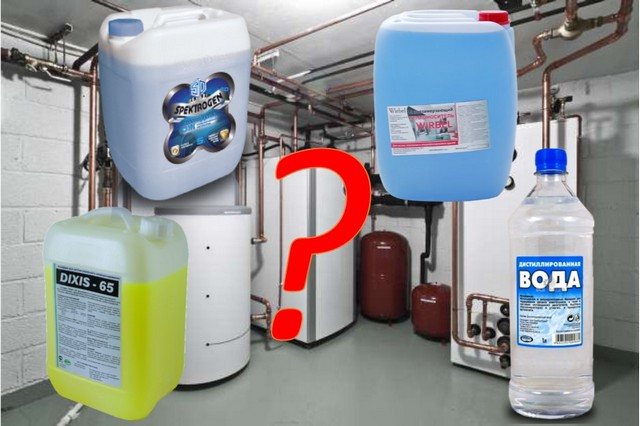

Heat carrier for the heating system of a country house
In general, it is worth choosing a coolant even at a time when the project of the entire heating system is being developed. This will allow you to choose the right equipment - it is not so easy to convert a water system for antifreeze.
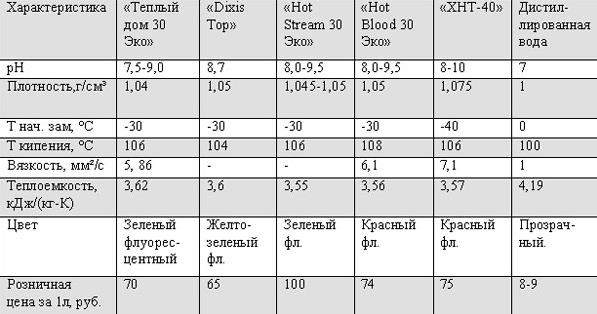

Heat carrier index table
What is a coolant and what should it be
- Safety. From time to time, there are leaks in the heating or they require maintenance and repair. In order for the repair work not to be dangerous, the coolant must be harmless.
- Harmless to the components of the heating system.
- Must have a high heat capacity to transfer heat effectively.
- Have a long service life.
The heat carrier for heating systems is selected according to the operating conditions
Given these requirements, the most suitable liquid for the heating system is water. It is safe, harmless, has a high heat capacity, and the lines of operation are unlimited. But in heating systems where there is a high likelihood of downtime in winter, water can do a poor job. If it freezes, it will burst pipes and / or radiators.
Therefore, antifreezes are used in such systems. At negative temperatures, they lose their fluidity, but the equipment does not tear. So, from this point of view, choosing a coolant for a heating system is easy: if the system is constantly monitored and in good working order, you can use water.
How to fill in the system correctly?
So, the coolant has been selected, the heating system has been built. It remains only to pour the substance inside the pipes and you can heat the house. How it's done?
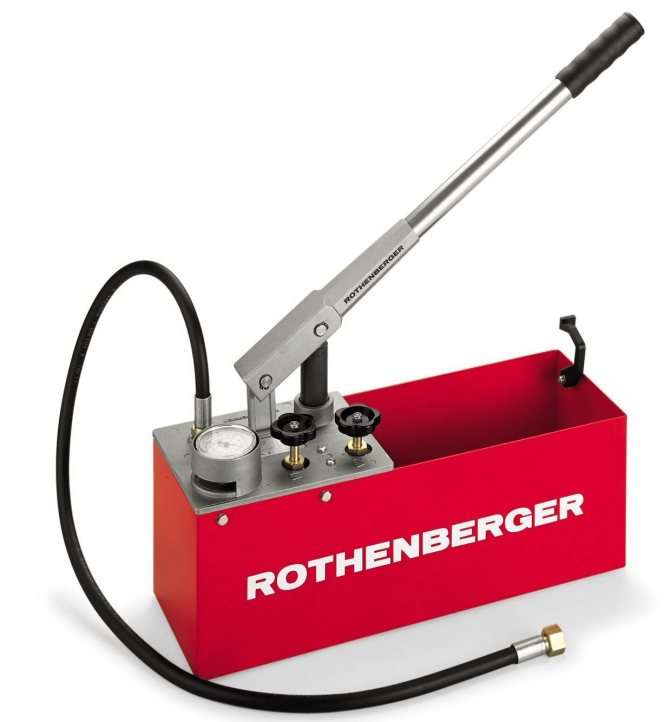

Hydraulic heating medium injection tool
Step 1. We connect one end of the hose to the lowest point of the heating system, which is intended for filling and draining the coolant (check valve), while we put its other end in a special container of the hand pump. We fill this container with a coolant.
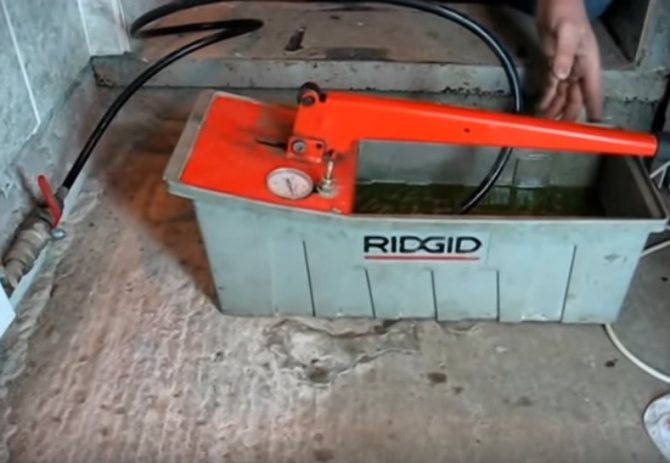

Pump capacity is filled with coolant
Step 2. We open the tap that blocks the drain in the heating system.
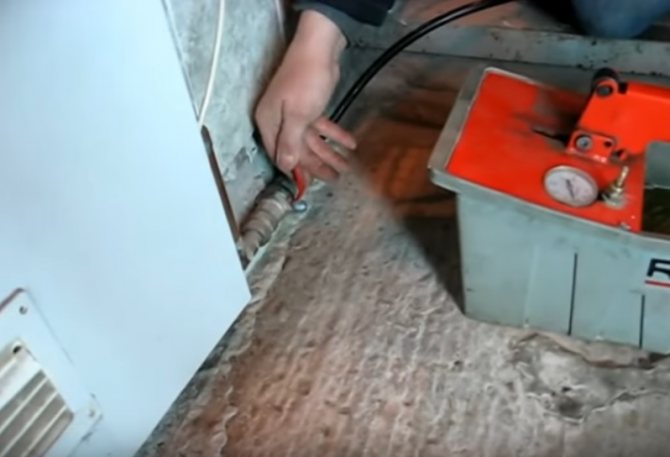

The tap is opening
Step 3. Using a hand pump, which can be purchased at any plumbing store, we pump the coolant into the pipe system. At the same time, we monitor the pressure inside them using a pressure gauge.
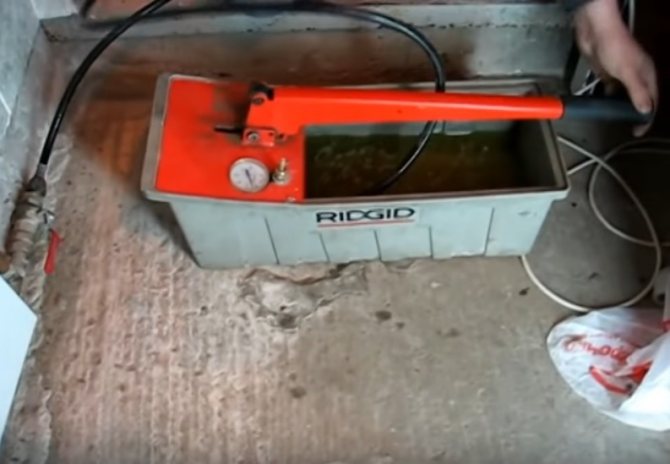

Coolant injection
Step 4. Continuing to monitor the pressure readings on the manometer, we pump the coolant into the system to an indicator of 1.5. After that, turn off the tap and turn off the pump.
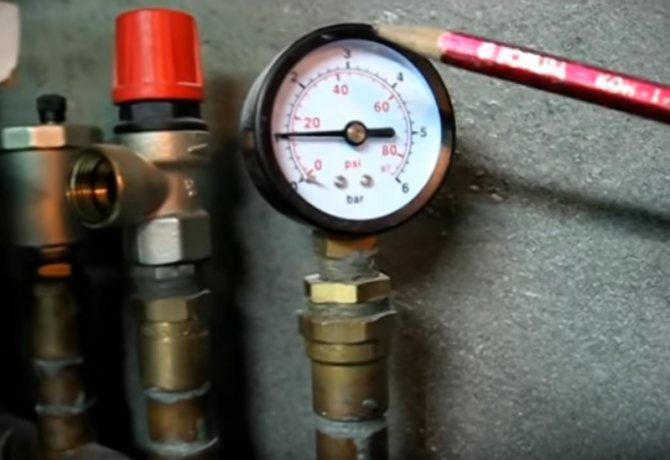

When working, you need to monitor the pressure
Advice! Before fully pumping the system, be sure to check the performance of the check valve. To do this, after pumping a little coolant into the system, close the valve and leave it overnight, after which we check for leaks.
By the way, before pouring distilled water into the heating system, be sure to rinse the pipes with plain water. In this case, both the newly assembled system and the one that has been working for a long time are subjected to the procedure. Otherwise, various impurities may remain in the radiators, which will deteriorate the quality of the water.
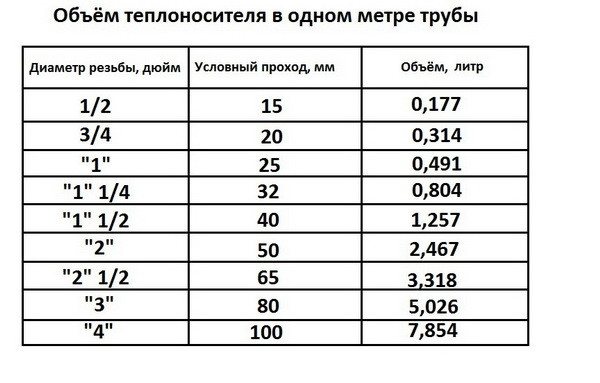

The flow rate of the coolant in the heating system is easier to determine from the table

